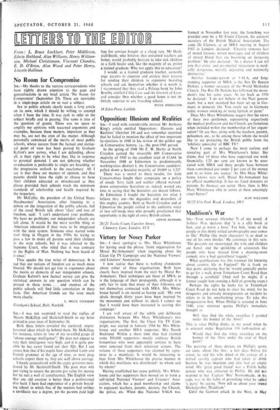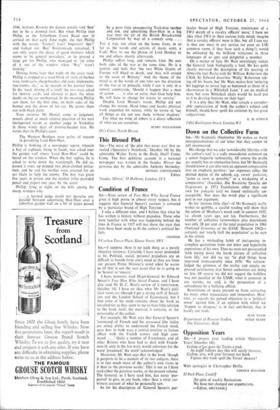Maddison's War
SIR.—Your reviewer (October 7) of my novel, A Solitary War, declares that 'it is a silly book at best, and at worst a bore.' For him, 'none of the people in this thinly veiled autobiography ever comes to life.' Phillip (the main character) 'is as dead as one of his own thistles.' He continues in this vein. 'The peasants are stereotyped, the wife and children are banal, and the sprinkling of aristocrats like people who have strayed from a drawing-room comedy into a bad agricultural tragedy.'
What qualifications has this reviewer for knowing about country life in England? He is frank on that point, declaring that he 'would generally prefer to go for a walk down Tottenham Court Road than through a cornfield.' (And well he might, if a farmer caught him crossing a field of growing crops.) Perhaps the sights he looks for in Tottenham Court Road do not help to clear his mind, for he misquotes and entirely misrepresents an incident he refers to in his unrefreshing prose. • To take this misquotation first. When Phillip is arrested in June 1940, your reviewer quotes Phillip's immediate thought as Will they find the white swastikas I painted under the bonnet of the Alvis?
This is what Phillip thinks in my novel when he is arrested under Regulation 18b (sub-section a): Would they find • the white swastikas on the bonnet of the Alvis under the coat of black paint?
The painting of these devices on Phillip's sports car came about like this: a few days before his arrest, he and his wife dined at the cottage of a retired cavalry captain who had taken to drink because he was impotent and also had an empty mind. His 'great good friend' was a Polish ballet dancer who was attracted to Phillip. He did not respond to her. Captain 'Boy' Runnymeade, in his cups, was in the habit of provoking what he called 'a party' by saying, 'Now tell us about your friend Shickelgruber, Maddison.' . . Until the German attack in the West, in May
1940, Stefania Roswitz the dancer usually told `Boy' not to be a damned fool. But when Phillip (not Philip, as the Tottenham Court Road sees it) arrived on that early June night, she met Phillip with the words, 'Traitor! Liar! Impostor! Spy!' and walked out. 'Boy' Runnymeade remarked, 'I can only regret the decay of good manners which seems to be general nowadays,' as he poured a large gin for Phillip, who managed to 'tip some of it out of the window when "Boy' wasn't looking.'
Driving home later that night on the coast road, Phillip is stopped at a road-block of 'coils of barbed wire, farm-carts, sheep-hurdles. old rusty implements. tree-trunks, etc.,' as he records in his journal later. In the 'weak shining of a torch' the two were asked for identity cards, and allowed to pass. the white daubs on the car unobserved. In the morning Phillip saw them, for the first time, on both sides of the bonnet and the doors of his car. He paints them out with black paint.
Your reviewer Mr Daniel, come to judgment, reveals about as much relative precision of his next (mis)quoted words as another judge in Yorkshire in those windy days of tortoise-headed fear. He writes that (in Phillip's eyes) The Western Brothers were guilty of treason in parodying Lord Haw-Haw.
Phillip is thinking of a newspaper report, wherein a boy of eighteen, living in Leeds, was asked over the garden wall where 'Lord Haw-Haw' could be heard on the wireless. When the boy replies, he is asked to write down the wavelength. He did so, passed it over, up popped two plain-clothed police- men, and he and his mother were arrested for an act likely to help the enemy. The boy was given five years in prison and the mother (who provided pencil and paper) one year, by the court.
Phillip, lying at night on the hills among his sheep, wonders why . . . a learned judge could not perceive any parallel between advertising Haw-Haw over a suburban garden wall on a bit of paper passed by a poor little unsuspecting Yorkshire mother and son, and advertising Haw-Haw in a big way over the air of the British Broadcasting Corporation by way of a comedy song. . . .
For it was, too often on the home front, in so far as the words and actions of many went, a Cads' War, to use the phrase of Lord Hankey to me and others shortly afterwards.
Phillip suffers long, and remains kind. He sees both sides of the war at the same time. He is a patriot, and feels that 'the two White Giants of Europe will bleed to death, and Asia will extend to the coast of Brittany.' And the theme of the novel is. in the words of one who saw the direction of the war at its pinnacle, while I saw it only in a remote countryside, 'Should it happen that a man of action . . . is also an artist, then God help him. He will have to change his nature to survive.'
Despite Lord Moran's words, Phillip did not change his nature. Hard times and harder physical work expanded his nature, while he strove to 'see all things as the sun sees them, without shadows.'
For what we write of others is a direct reflection of what we are ourselves.
HENRY WILLIAMSON
Ox's Cross, North Devon



































 Previous page
Previous page